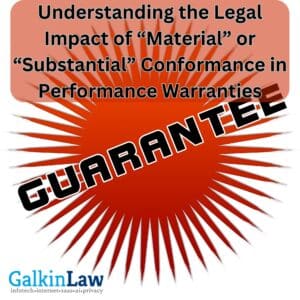
In software and service agreements, performance warranties play a crucial role in defining the expected quality and functionality of a product or service. These warranties promise that the product will work as described—but the language used in these warranties can vary significantly, and each variation brings its own legal implications. This post will explore the difference between a performance warranty stating “material” or “substantial” conformance and one without these qualifiers.
🌟 What is a Performance Warranty?
A performance warranty is a contractual assurance that a product or service will meet certain standards or perform according to defined specifications. In the software and SaaS industry, a common type of performance warranty promises that the software will perform as described in the documentation.
However, performance warranties can be worded in ways that set different levels of obligation for the vendor. A warranty might state that the software will conform to the specifications “in all material respects” or “substantially conform” to them, while other warranties offer a stricter guarantee by omitting such qualifiers.
🔎 Breaking Down the Key Differences
- Material or Substantial Conformance
When a performance warranty uses terms like “material” or “substantial” conformance, it introduces a certain level of flexibility. This type of warranty promises that the product or service will conform to the specifications in all material respects—in other words, it allows for minor deviations that do not impact the core functionality.
Legal Implications:
- Higher Burden of Proof for the Customer: The customer must show that any non-conformance is significant or “material” enough to affect the functionality or intended use. Minor bugs or inconsequential discrepancies generally won’t be considered a breach of warranty.
- Lower Risk for the Vendor: This language can protect the vendor by reducing the chances of a lawsuit over minor issues that don’t impact the software’s core functionality.
- Flexibility in Interpretation: Courts generally interpret “material” or “substantial” based on the overall function of the product or service, rather than expecting absolute conformance. Vendors may find it easier to defend against claims because they can argue that any non-conformance was not material to the performance.
- Strict Conformance (Without Qualifications)
A performance warranty that does not use qualifiers like “material” or “substantial” instead provides a stricter guarantee. Here, the vendor promises that the product will conform exactly to the specifications—no deviations allowed, no matter how minor.
Legal Implications:
- Lower Burden of Proof for the Customer: The customer does not have to demonstrate that the non-conformance was “material.” Even minor issues could potentially constitute a breach.
- Higher Risk for the Vendor: This type of warranty exposes the vendor to a broader range of claims, as the customer could point to any variance as a failure to meet the warranty.
- Reduced Flexibility in Interpretation: Without qualifiers, courts tend to interpret this warranty strictly. If a feature or function deviates from the specifications, even slightly, the customer may have grounds for legal recourse.
🎯 Practical Implications for Both Parties
When drafting or negotiating these warranties, understanding these distinctions helps both parties achieve a balance between protection and flexibility.
- For Vendors: Including qualifiers like “material” or “substantial” helps manage risk by setting realistic expectations for conformance. This wording acknowledges that minor, non-critical issues are likely to arise and reassures vendors that such issues won’t necessarily lead to breach of warranty claims.
- For Customers: A warranty without qualifiers provides stronger assurances that the product will perform exactly as advertised. However, customers should assess whether strict conformance is essential to their business operations.
⚖️ Legal Precedents and Enforcement
Courts have consistently upheld the distinction between warranties with and without materiality qualifiers. In cases where materiality is part of the warranty, courts focus on the impact of the non-conformance on the overall functionality. Without such qualifiers, courts generally hold the vendor to a higher standard, demanding complete adherence to the specifications.
📌 Final Thoughts
The choice between these two types of warranties isn’t just a matter of language—it’s about managing expectations and risk. Vendors who want to protect themselves from minor claims may prefer the material or substantial conformance standard. Customers, on the other hand, should carefully consider whether a strict conformance warranty is essential for their business needs or if a more flexible approach is sufficient.
By understanding and negotiating these warranties thoughtfully, both vendors and customers can find a balance that meets their respective goals, while minimizing the potential for future disputes.
#PerformanceWarranty #ContractLaw #SoftwareAgreements #RiskManagement #LegalInsights
